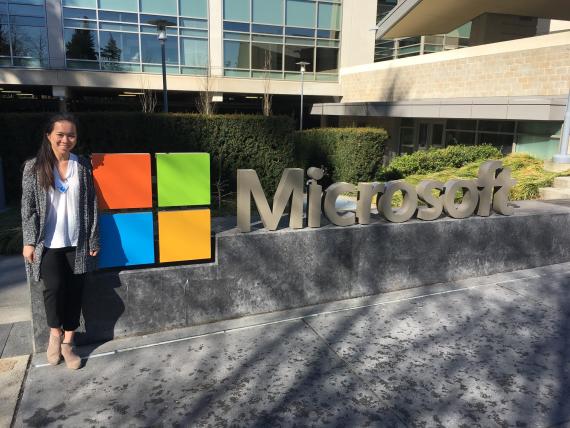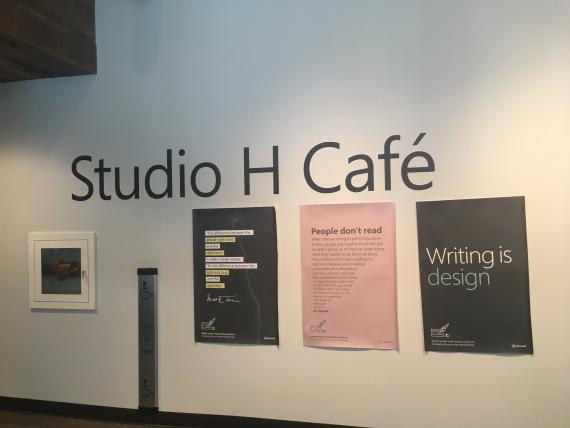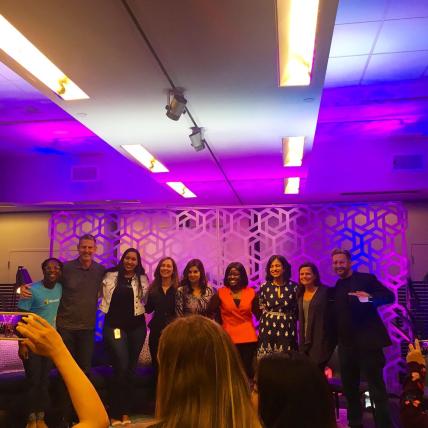
“Are you sure you can study English?,” my mother asked me the day I was accepted as an English major at UW. Ever since I told her I wanted to study literature in high school, she was concerned about the career opportunities I would be able to find. My Vietnamese mother knows little English and grew up in an economy where studying language doesn’t lead to lucrative careers. Even in her life, she didn’t use her pedagogy degree, so her question was meant to serve as a “reality-check” whenever I spoke highly of fiction, creativity, and Carol Ann Duffy.
One and a half years later, with the enriching experience of a few writing gigs and a London study abroad trip, I applied for a Microsoft Content Experience (CX) internship. Four days after my on-site interview at the company’s headquarters in Redmond, the recruiter called and said, “I’m here to bring good news”. I immediately covered my mouth to muffle my screams of joy.
“Are you sure you can work at Microsoft?,” my mother asked when I was 2 weeks into my internship. What she wanted to know was whether I was “fitting in” the American corporate culture. “Do your American co-workers understand you?” and “Can you handle the work?” were some of her recurring thoughts. This time, I also began to question if I had what it took to cut it at a “Big 5” tech company. As much as my mother poked my insecurity, she had all the reasons to doubt her daughter’s incongruence with social norms - I study literature in a language that is not mine, and I work in a male-dominated engineering company as a woman in humanities.
I remember sitting in a big conference room with all the interns on orientation day. When the host said “Who here is a software engineer intern?,” three-quarters of the room chanted in unison. How many CX interns were there in total? Four.
Writing in tech is a career option that is trending among humanities majors. This article offers advice and guidance for students with humanities backgrounds who are wondering if tech is right for them.
So what does a CX intern do?

The job description that I was sent described a CX intern as a “tech-savvy writer” who can “design and write content in-product and for the web that helps customers achieve great things with Microsoft hardware, software, and services,” and “map what you’re delivering to the big picture.”
Although recruiters seek out writing majors, the work isn’t just pure writing. Interns are expected to show critical thinking in the “development, design, deployment, vision, and business strategy” of their work. This is true in my case because I had to build a project that was born out of an abstract idea from scratch. What made my experience enriching was the autonomy I had over my content, thanks to a team who supported my creativity, my experiments and allowed me to grow from mistakes - all the necessary training for growth mindset.
Intern projects vary depending on your skillset and managers. The other CX interns created an inclusive security word bank, an internal writing style guide, and templates for a new product; skills such as design, data collection, and project management were integral in their jobs. As for me, I led the inclusive language project using design thinking methodologies and collaborating with teams in the United States!
Microsoft, without doubt, creates a successful intern program every year. The company hosts activities around campus to encourage a balance between work and social life. The heart of intern events aims to build curiosity in tech and give us exclusive networking opportunities even with executives! Some of my few memorable events were the Women’s Symposium (with Amy Hood), International day, Intern Day (with Satya Nadella, Brad Smith, and Sean Paul), the Intern Yacht Party, Food Fest, Fireside chats with CVPs, and the Treehouse Talks, a storytelling event where I did a stand-up!

The future of writing in tech.
If there’s a bubble that’s growing for writers in tech, it’s Conversational User Interface (CUI) - the design of conversations for voice assistants and chatbots. During my internship, I shadowed the Personality Chatbot Project led by my manager. As a team, we built queries for each scenario, strategies for localizers, and make sure conversations between a human and bot are ethical and inclusive.
Collaborating in this project makes me excited to be a tech writer in the future. No longer were the days of engineering jargon and unfriendly 404 errors. The voice and tone of devices are changing to become more human and natural to interact. As CEO Satya Nadella said “Human language is the new UI layer, bots are like new applications, and digital assistants are meta apps. Intelligence is infused into all of your interactions.”
In the years to come, I can only hope the next strings of words to be equally as important as the next strings of code. Writers are in the process of rebranding the voice of artificial intelligence (AI), as well as that currently on screens. However, with “great dialog comes great responsibility” - coined by the original editorial writer of Cortana, Deborah Harrison - writers have the challenge of creating dialogues that honor human emotional truth at the moment of interaction.
How can I prepare a resume for a CX internship?
Breaking into CX is hard for students. Many people enter User Experience (UX) Writing or CX (as they call it at Microsoft) with a rich writing portfolio in professional industries. Since the field is still emerging, there aren’t many resources for students to explore.
However, tech companies offer CX internships every year. English, Communications, and Journalism majors are in demand for these roles because we specialize in writing, storytelling, and strategizing content. These skills can be built in extracurricular activities such as working as editors, writers, journalists, or video editors for on-campus organizations. For writers, preparing some published articles is a strong stepping stone - opportunities to write for a tech, neuroscience, literary journal, and the university’s newspapers are open yearly.
In addition, having some knowledge of design thinking and data can make you a better candidate. I am an English major with an Informatics minor; the knowledge I gained in my Informatics classes allows me to leverage my colleagues’ work faster. Even if getting another minor or a second major is not an option for you, building competency in design thinking can be learned from reading and social networking. To be honest, most of my design competency comes from my extracurricular hustle. Within UW, there are so many student-led organizations that offer mentorship from professionals in the industry. During Winter quarter, I participated in design sprints hosted by Dubstech’s “The UX Club.” Not only did I improve my ideation and prototyping skills, but I’ve also made connections with members who are either ahead or on the same journey as me. Realizing the potential of this club, I wrote articles documenting the events and the values of student-to-student teaching.
Whatever you do, don’t forget to show your work in a portfolio. This is your space to brand yourself and flaunt your talent. Something I witnessed among my colleagues at Microsoft is that everyone is unique and comes from all walks of life. In my office alone, there are published authors, poets, teachers, songwriters, bloggers, video game writers, film enthusiast, booksellers, and a founder of an ethical clothing company. There is not one mold to emulate, but to be yourself and sell your story (that’s when the storytelling skill comes in handy). For me, coming from Vietnam to study literature and expressing the values of diversity and inclusion made a stellar impression, despite feeling insecure about this very own identity at the beginning of my journey.
My last email as a Microsoft intern was titled “Standing on the shoulders of giants,” one of my favorite quotes by Isaac Newton. It expresses the meaning of “discovering truth by building on previous discoveries.” That was the experience I had as a CX intern. Every day, I had the opportunity to meet a colleague who has gone through years of learning, and is now impacting billions of customers, one UI string at a time.
Near the end of my internship, I have a clearer professional and personal vision, and I’m privileged to realize this early in my career. That’s what internships are for - to make you hopeful about who you’re dreaming to be.